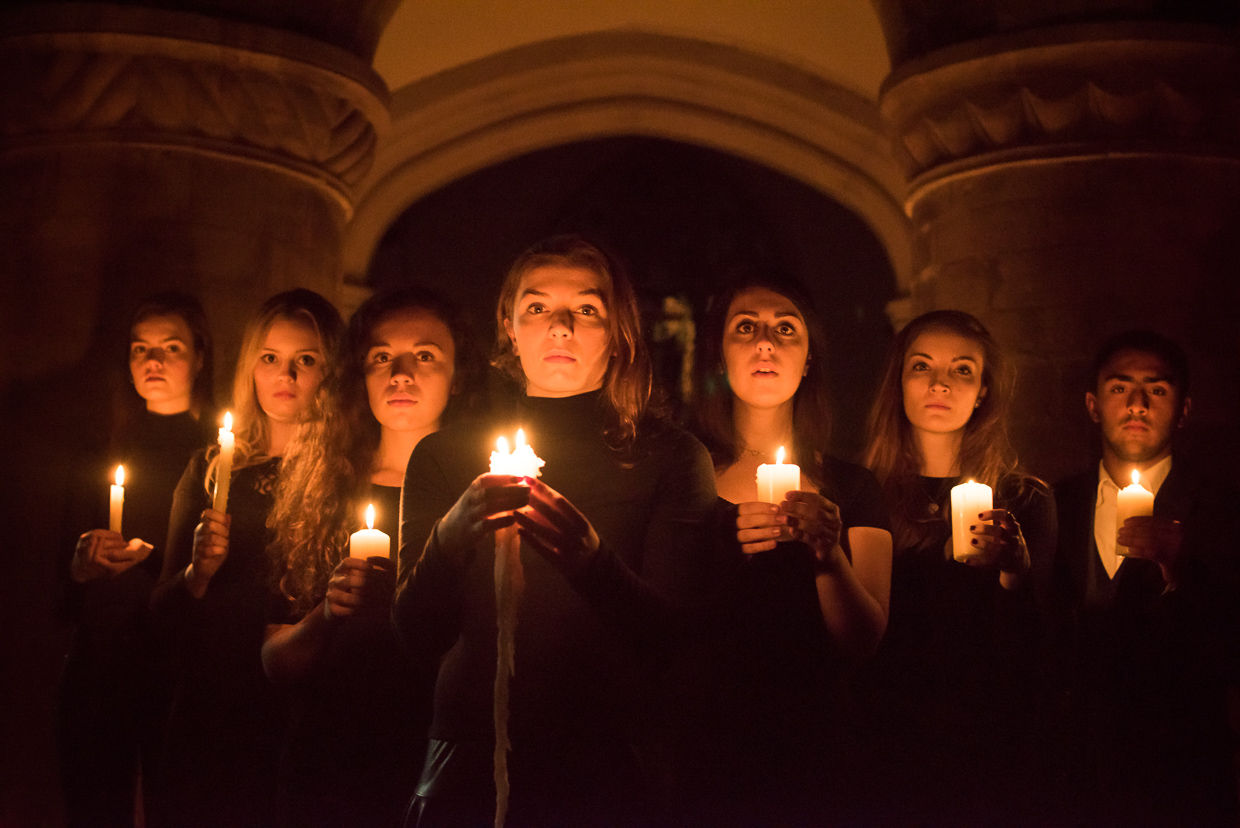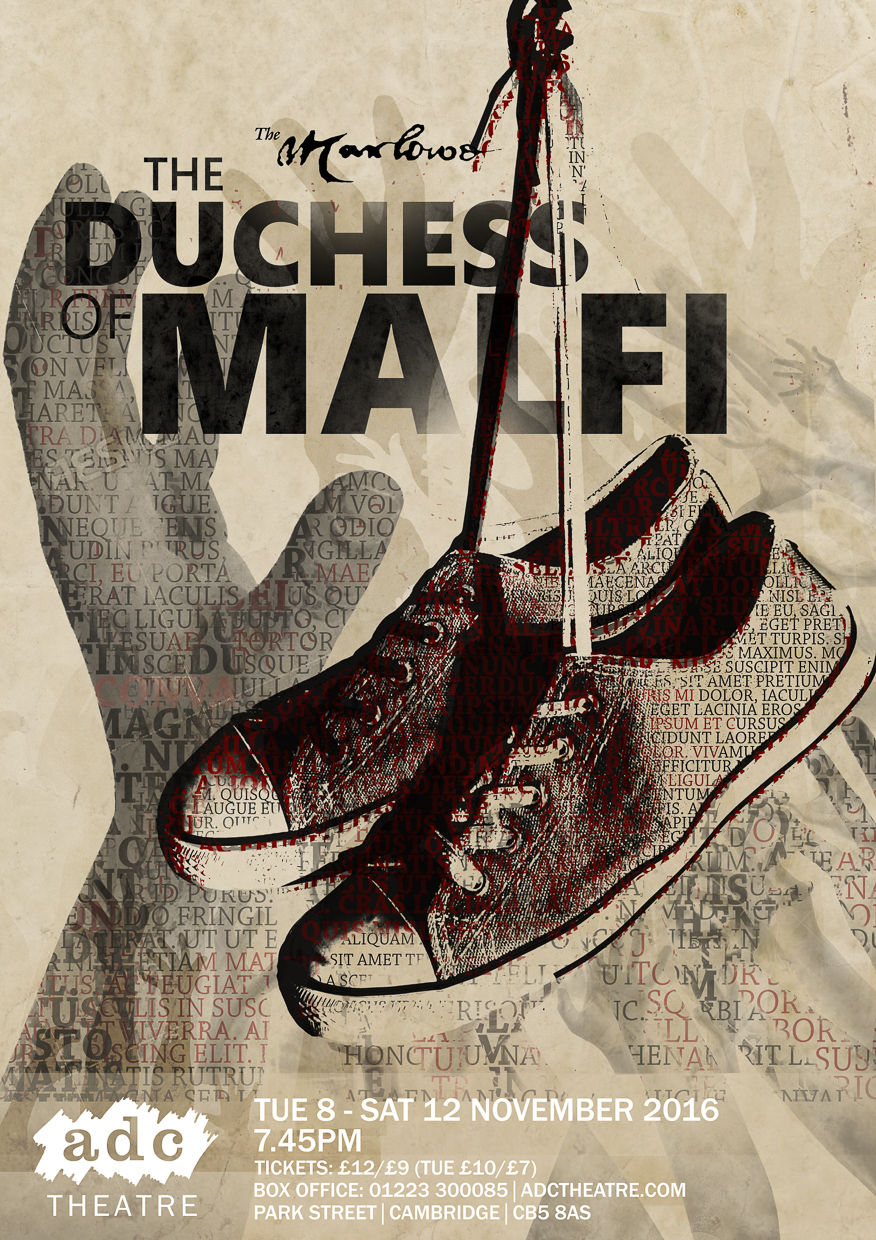
WRITER-DIRECTOR
ANASTASIA BRUCE-JONES
The Duchess of Malfi
“Revenge for the Duchess of Malfi, murdered.”
In the court of Malfi, the jealous, incestuous obsession of one man sets into motion a series of events that will end in tragedy and redemption.
ADC Theatre: 8th-12th November, 2016

Cast
Kate Marston: The Duchess
Sabrina Gilby: Bosola
Ben Walsh: Duke Ferdinand
Joe Sefton: Antonio
Joe Tyler Todd: The Cardinal
Isobel Laidler: Cariola
Helen Vella Taylor: Julia
Georgina Taylor: Delio
Gilbert Dicks: Florizel
Samuel Broadway: Philario
Ayla Boz: Silvia
Jerome Burelbach: Castruccio
Calum Maney: The Marquis of Pescara
Isaac Jordan: Malatesti
Joe Pieri: Silvio
Abbas Khan: Roderigo
Dylan Smith: Grisolan
Peter Chappell: Courtier
George Booth-Clibborn: Courtier
Elise Hagan: Sleeper
Eve French: Sleeper
Zoe Morris: Sleeper
Sneha Sen: Sleeper
Saskia West: Sleeper
Cate Ash: Sleeper
Evie Smyth: Sleeper
Natalie Reeve: Sleeper
Georgia Cassidy: Sleeper
Alicia Hussey: Sleeper
Eleanor Burke: Sleeper
Maya Yousif: Sleeper
Crew
Director / Adapter / Choreographer: Anastasia Bruce-Jones
Producer: Georgia Humphrey
Set Designer: Jack Parham
Technical Director: Toby Molyneux / Leah Ward
Lighting Design: Noah Fram
Composer: Gary Rushton
Musical Director: Anthony Gray
Costume Designer: Christina Maurice
Stage Manager: Lottie Tucker / Caitlin Walsh
Deputy Stage Manager: Issy Houston
Publicity: Oliver Baldock
Interview
Interview
INTERVIEW WITH THE DIRECTOR
Peeking into the mind of Anastasia Bruce-Jones
“So first off, I’ve got to ask, what’s the shoe thing about?”
‘Well, historically shoes have often been used as a way to control women, or oppress them – high heels, for example, were used hundreds of years ago by prostitutes so that customers could follow the imprints they left to the brothel. Then you’ve got Chinese foot binding, and the fetishisation of women’s feet across a bunch of cultures. But it’s more than that, it’s the culture of women wearing shoes which make it more difficult to move around, which – whether the particular person wearing them has done so for this reason or not – are intended to give a woman height (making her more conventionally attractive) and increase her value as an aesthetic object. And it’s not just women, the first people to wear heels were men in Ancient Persia, so it becomes one of those things where society inflicts laws upon itself, which restrict and disadvantage everyone.
‘So this whole idea and the way wearing high-heels seems to symbolise the control and sexualisation of women – historically and socially speaking, of course, this is no campaign against heels themselves – really is symbolic of what our whole production is about; a growing fear of losing autonomy in a world where everything seems sort-of out of our control and every choice is, in a way, already made for us.
‘They’re also really important in the play of course in a totally different way, but this is how we’ve been thinking about them and their value thematically, or symbolically.’
“This loss of autonomy you’re talking about, is that in the play or currently - in the real world?”
‘Both! So much is out of our control these days, and the prescriptive way we live our lives (school, university, job, marriage, children – it’s all laid out for us, this plan of ‘how we should live our lives’) can feel really oppressive, so I was really keen to get a sense of that in the show.
‘Without giving too much away, our essential idea is that this show should feel like everyone, including the audience, is experiencing some weird, collective nightmare about what society might become – although I realise that probably just sounds like pretentious waffle. And feminism – or equality, if you prefer – and the loss of autonomy, are at the centre of that.’
“Feminism is quite an interesting angle to go for isn’t it, what with this being a Renaissance play?”
‘Well, yes and no. In terms of Renaissance theatre, we’re definitely talking about a lot of sexism going on – there are a crippling shortage of good roles for women, and you see the same stereotypes coming up again and again – not to even mention the fact that these ‘women’ would have been played by men. DoM has, for me, just a flicker of something different. The Duchess is such a strong woman, a woman who falls blamelessly at the centre of some truly cruel men and circumstances – her selflessness and strength in the face of all this sets her apart. She plays what Renaissance audiences would have thought of – and what, sadly, we still stereotype as – the ‘man’s role’ a lot of the time, in that she sacrifices herself to get her family to safety and then dies with absolute dignity.
‘Of course, we’ve also made some changes which shake things up a bit. We’ve changed the roles of Bosola and Delio so that they’re now women, and I think it massively adds to the dynamic of the whole play. Bosola totally defies the stereotypical roles of women in Renaissance theatre. She’s a soldier. She’s not lead by her emotions. Her morals are ambiguous and she walks a tough line between good and evil. She is the only character in the play that becomes aware of how little control she has over her own destiny, and chooses to try to take back that control.
‘In general, there are going to be a lot of surprises for audiences who know the play, in terms of what we’re doing with it. I wouldn’t say that taking a feminist angle is by any means the greatest of those.’
“Wow, ok, so there are a fair few surprises in store for us – I think I’ve heard you’ve got some kids involved?”
‘Yes! They’re very talented. Very professional – in fact, we all got the giggles in rehearsal the other day and they were the first to recover. It’s great to work with actors who are completely uninhibited by how they think they should behave – I think we’re all learning from them.
‘But again, I wouldn’t say the kids are going to be a big surprise for the audience compared to some other things we’ve done. I can’t say too much of course, it would be sad to spoil it, but there’s one scene which we’ve sort-of added, which doesn’t have any dialogue, just choreography – and we’ve made quite a lot of other fairly dramatic changes like that.’
“Oh – choreography? So I’m guessing there’ll be some music we can look forward to as well then?”
‘Haha – yes, very much so. We have a completely original score for the show and there’s going to be an orchestra behind the stage playing it live every night.
‘Gary Rushton – he’s our insanely talented composer – has completely blown my mind. When I heard what he’d written for the first time I knew I had to up my game, because it sounds utterly professional. He’s a bit of a genius actually – it’s one of the reasons this show really shouldn’t be missed.’
“Ok, so go on, why shouldn’t we miss this – apart from the music?”
‘Gosh, all of it! Everyone involved is just brilliant – I feel really blessed to be working with these people.
‘Aside from anything, you’ll finally get to see why those shoes are important to the show – I haven’t given that away by any means. It would be a shame to be plagued by hanging shoes all over facebook and Cambridge and never find out why!’
Anastasia Bruce-Jones, Director of The Duchess of Malfi
REVIEWS



